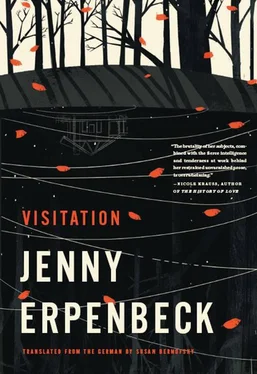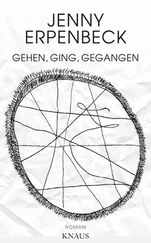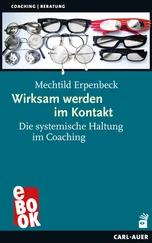The following spring, on instructions from the householder, all the windows of the main house, the bathing house and the extractor room are given a fresh coat of paint, the gardener stuff s more oakum into the gaps between the boards of the bathing house where the walls have become leaky and applies pine tar to renew the waterproofing. Sometimes when he is sitting on the steps of the apiary, smoking a cigar to protect himself from the swarms, the son of the writer couple — who comes only occasionally during vacations for a few days and the rest of the time lives in a home for children — sits down beside him and asks him questions about the life of the bees.
I A-M G-O-I-N-G H-O-M-E, was the sentence she last wrote on her typewriter yesterday. Now she takes out the sheet of paper and sets it off to the side, sets it on the stack, still not very high, of the already written pages of her new book, she removes a sheet of laid paper with a watermark from a drawer and begins her letter to the general concerning the new neighbor’s entitlement to lake access and concerning also the bathing house situated on precisely the bit of shoreline that is at issue — state property that she has been leasing for twenty years now along with the house — she addresses the general by his childhood nickname and in a familiar tone, and while she is writing her fury seeps away and turns into exhaustion. She asks herself what forces are at work here, what might be empowering a local official to speak to her of directives “from higher up.” Beneath the shroud of secrecy that a handful of comrades who became accustomed to this shroud during the era of illegality have managed to preserve even now, in this time of reinvented peace, something new is afoot, something even she is unable to recognize.
From her desk she can see the lake shimmering between the reddish trunks of the pine trees. Down in the kitchen the cook is making the plates clatter, the gardener is sitting on the threshold to his room smoking a cigar, on the big meadow her granddaughter and the boy next door are spraying each other with water, her daughter-in-law is just making her way down to the dock to sunbathe, the visitor is lying in a lawn chair beneath the hawthorn tree, her son is mowing the grass, and down below, in front of the workshop, her husband is painting the fishing stools, whose red paint is flaking off, green. The window stands open, and so she smells the lake and the sunshine, smells the smoke from the gardener’s cigar, but also the odor of roast meat rising from the kitchen, she smells the mowed grass and, when the wind turns and begins to blow from below, even the fresh green paint. The tapping of her typewriter mixes with the calls of the cuckoo, letter for letter it can be heard from both upper meadows, all the way down to the workshop and even on the dock, when the wind blows from above to below.
The doctor from the government hospital in Berlin, for whom she had successfully petitioned the municipality to get him permission to lease the orchard and the apiary, immediately had all the fruit trees chopped down — certainly not what they’d agreed on — and then tore down the apiary as well. With supernatural speed, practically overnight, unknown workers from Berlin soon thereafter put up a large house where the apiary had stood, and rumor had it that he’d even been permitted to purchase this house, which went against the usual practice. When she lodged a complaint with the municipality, she was informed that everything had been decided “higher up” and that further instructions had meanwhile been received to grant him lake access by reducing the size of the property she was leasing, the arrangement for a new fence leading down to the water was to be worked out as soon as possible. This young doctor, who hadn’t even been born yet when she returned to Germany after years of exile, was meanwhile personal physician to some high-up official and now, it seemed, actually had the gall to make his move against her using the invisible army whose generals she had rocked in her arms during her emigration.
She puts the letter in an envelope, addresses and seals it, then she takes up the sheet of paper she’d set aside earlier that morning and puts it back in the typewriter to go on working where she stopped the day before. I a-m g-o-i-n-g h-o-m-e. The keys of the typewriter she writes on have already been rubbed smooth, the individual letters can scarcely be distinguished from one another. It is still the same typewriter she brought with her on that odyssey from Berlin to Prague, from Prague to Moscow, and then from Moscow to Ufa in Bashkiria, and near the end of the war, when her son could already speak Russian fluently, back again to Moscow and finally, Berlin. She carried this typewriter in her hand through many streets of many cities, held it on her lap in overcrowded trains, gripping its handle tightly when in this or that foreign place, alone on an airfield or at a train station, she didn’t know where to go, when she’d lost her husband in the throng, or else his duties took him elsewhere and he’d boarded a different train. This typewriter was her wall when the corner of a blanket on a floor was her home, with this typewriter she had typed all the words that were to transform the German barbarians back into human beings and her homeland back into a homeland.
Home, all he wanted was to go home, the German official who’d been installed as mayor in a tiny little town in the so-called Reichsgau Wartheland wrote in his diary after a colleague had reported to him that while he was on vacation all the Jews from the entire region had been rounded up in the church, held there for three days and then loaded into gassing trucks and transported to the woods. The corpses of the ones who had already died during the three days in the church had been tossed into the gas trucks along with the living, the dead children hurled at the heads of their still living parents. Home, all he wanted was to go home, the mayor had written then in his diary. This diary was later included in the materials placed at her disposal for use in her radio show in the Ural region. By then the impending defeat of the Germans was already becoming quite clear, and every one of the Red Army’s victories brought her, her husband and their son who had been born in the Soviet Union that much closer to going back to Germany.
Holding the mayor’s diary in her hands, she’d felt disgusted that, as became clear from the further course of the diary, the German official did decide to remain in his post and office after all, that he continued to preside over this small town until the Red Army marched in and he fled to the West. But all the same she could never forget his sentence about just wanting to go home. Home! he’d cried out like a child that would give anything not to be seeing what it was seeing, but precisely in this one brief moment in which he hid his face in his hands, as it were, even this dutiful German official had known that home would never again be called Bavaria, the Baltic coast or Berlin, home had been transformed into a time that now lay behind him, Germany had been irrevocably transformed into something disembodied, a lost spirit that neither knew nor was forced to imagine all these horrific things. H-o-m-e. Which thou must leave ere long . After he had swum his way through a brief bout of despair, the German official had applied to retain his post. Those others, though, the ones who had fled their homeland before they themselves could be transformed into monsters, were thrust into homelessness by the news that reached them from back home, not just for the years of their emigration but also, as seems clear to her now, for all eternity, regardless of whether or not they returned. I just want to go home, just home, she’d often thought in those days, and from the Urals had directed her machine gun fire at her homeland, word after word. But now that no one country was to be her homeland any longer but rather mankind in general, doubt continued to manifest itself in her as homesickness.
Читать дальше












